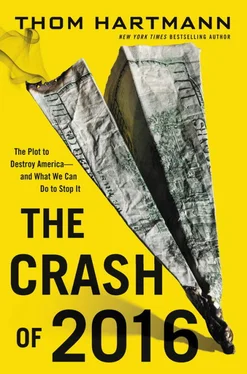And that’s when the Eurozone crisis will hit a critical turning point. Up until now, Germany has spent a lot of money keeping the Eurozone together, not only to enrich its own economy but also to protect its economy from the damage that would ensue if the Eurozone breaks apart.
But sometime in the next few years, German policy makers will deem the collapse of the Eurozone as a necessary road bump in their transition to new developing economies. And they just might be willing to go through a recession, knowing that their structurally sound economy will leave them in better shape on the other side of it.
At this point, without fear of a Eurozone collapse, Germany and the Troika will demand even more radical austerity.
The world got a glimpse of what happens when austerity goes too far when the tiny Mediterranean member of the Eurozone, Cyprus, became the fifth country in need of a euro bailout.
With little fear of the consequences of a Cyprus exit from the euro, Germany and the European Central Bank demanded a first-of-its-kind austerity on savers, average people who had money deposited in banking accounts in the nation.
Initially the European Central Bank demanded, as collateral for a 10-billion-euro bailout package, a percentage of all banking deposits in Cyprus.
This had an expected result: People rushed to the banks to pull their money out before it could be taxed. Cyprus had to shut down all their banks for over a week, and to set withdrawal limits. Just floating the idea of confiscating banking accounts shattered faith in the Cypriot banking institutions.
Whether or not Germany and the Troika take this aggressive posture toward other bailouts in the future doesn’t matter all that much. The damage has already been done. The already fragile European banking system received another loss of confidence.
These fears were encapsulated in an op-ed that ran in the Irish Examiner during the Cyprus crisis, in March 2013. “The raid on Cypriot banks deposits,” the authors noted, “held in the name of ordinary people, businesses, institutions, communities, and prudent savers, breaks one of the fundamental trust-based relationships that has sustained western societies for centuries.”
It goes on, “It sets a precedent that will reverberate across Europe and find particular resonance in other supplicant countries dependent on external finance.”
Of course, Ireland knows this situation as well, being a victim itself of Germany’s austerity.
Then the op-ed asks the expected question: “If bank deposits can be raided by a government in one bankrupt Eurozone country, then why not in another?”
Columnist Henry Blodget for Business Insider noted the Continental shock wave from Cyprus. He wrote, “Other depositors at weak banks all over Europe, in places like Spain, Italy, and Greece, will rightly wonder whether this is the beginning of a new era of bank bailouts.”
He goes on to ask, “What do you think those other depositors in Spain, Italy, Greece, etc., are going to feel like doing when they realize that, if their banks ever need a bailout, they might have their deposits seized?”
Nearing the Crash of 2016, Eurozone nations crippled by austerity and unable to print their own currencies will ask for more and more bailouts. This will spark runs on the banks across Europe, leading to a series of terrific failures and economic shocks across Europe.
Germany and the Troika will not have nearly enough money, or support, to reach into the bailout coffers anymore. Country by country the Eurozone will disintegrate.
In the United Kingdom, officials have been planning for another Great Crash for years. As a November 2011 article in the Telegraph exposed, “Diplomats are preparing to help Britons abroad through a banking collapse and even riots arising from the debt crisis.” 165
The article goes on to say that the United Kingdom believes “that a euro collapse is now just a matter of time… [and] planning for extreme scenarios including rioting and social unrest” are under way.
Referring to the failure of Lehman Brothers bank, which shocked the financial system in 2008, the chief economist at the European Central Bank warned in July 2012 that the “Eurozone crisis is now much more profound and fundamental than at the time of Lehman.”
By inflicting economic pain on working people across Europe, Germany is playing with fire on a continent that saw the bloodiest war in human history. A war that people are just now forgetting about.
It’s hard to imagine that the European Union, after winning a Nobel Peace Prize in 2012, would descend into war in 2016.
But prior to the French Revolution, people thought things were going great, too. As de Tocqueville writes: “No one in 1780 had any idea that France was on the decline; on the contrary, there seemed to be no bounds to its progress. It was then that the theory of the continual and indefinite perfectibility of man took its rise. Twenty years before, nothing was hoped from the future; in 1780 nothing was feared. Imagination anticipated a coming era of unheard-of felicity, diverted attention from present blessings, and concentrated it upon novelties.”
And, indeed, there had been a bubble prosperity. As de Tocqueville notes, “Public prosperity began to develop with unexampled strides. This is shown by all sorts of evidence. Population increased rapidly; wealth more rapidly still.”
To prove his point, he cites numerous sources: An official of the time states that in 1774 “industrial progress had been so rapid that the amount of taxable articles had largely increased. On comparing the various contracts made between the state and the companies to which the taxes were farmed out, at different periods during the reign of Louis XVI, one perceives that the yield was increasing with astonishing rapidity. The lease of 1786 yielded fourteen millions more than that of 1780. Necker, in his report of 1781, estimated that ‘the produce of taxes on articles of consumption increased at the rate of two millions a year.’”
British writer Arthur Young (1741–1820) wrote in his autobiography 166that when he visited France in 1788, the commerce of Bordeaux was greater than that of Liverpool, and adds that “of late years maritime trade has made more progress in France than in England; the whole trade of France has doubled in the last twenty years. Due allowance made for the difference of the times, it may be asserted that at no period since the Revolution has public prosperity made such progress as it did during the twenty years prior to the Revolution.”
Thus, while “bread lines” and “bread shortages” and “bread riots”—juxtaposed with mind-boggling excesses including lavish parties at the court of Louis XVI—are often cited as a simplistic explanation for the French Revolution (egged on by the example of the Americans), the real cause, de Tocqueville suggests, was a rapid reversal of fortunes. While people will tolerate terrible poverty—and do, daily, all over the world (and did in his day, too) without revolution or war—they will not tolerate a rapid change from economic circumstances they expect to those they don’t.
This is not, of course, an idea unique to de Tocqueville, although he highlighted it in a way that lit up dialogue in the mid-nineteenth century about the American Civil War and other wars around the world. More recently, here in the United States, in 1977, Harold E. Davis wrote a brilliant monograph for the Georgia Historical Society titled The Scissors Thesis, or Frustrated Expectations as the Cause of the Revolution in Georgia . Paraphrasing the work of earlier social scientists and historians Professors R. R. Palmer and James Chowning Davies, he wrote: “Revolutions are most likely to occur when a prolonged period of objective economic and social development is followed by a short period of sharp reversal.” Revolution occurs when “reality breaks away from anticipated reality.”
Читать дальше












